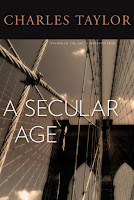Saturday, February 6, 2021
"even when [people] come to feel [the immanent frame] as obviously supporting closure, this doesn't constitute a valid argument. The sense of 'obvious' closure [against transcendence] is not a perception of rational grounding, but an illusion of . . . 'spin'. . . . [W]hile the norms and practices of the immanent frame may incline to closure, this neither decides the effect that living within the frame in fact will have on us, nor even less does it justify the closed take."
"The issue here is not how many positive invocations of the body we hear"
Charles Taylor, A secular age (Cambridge, MA: The Belknap Press of Harvard University Press, 2007), 554.
A flat or bemused tolerance, as it were, but no fraternal correction
Jeffrey A. D. Weima
on 2 Thess 3:6-15, 1-2 Thessalonians, Baker exegetical commentary on the
New Testament (Grand Rapids, MI: Baker
Academic, 2014), 627, but without Weima’s transliteration and more of the Greek (which I have taken from pp.
140-141 of the 1916 LCL edition ed. and trans. Haines). Underscoring and boldface mine.
Marcus Aurelius is invoking the dirty competitor figuratively: "Act much in the same way in all the other parts of life. Let us make many allowances for our fellow-athletes as it were. Avoidance is always possible [(ἔξεστι . . . ἐκκλίνειν)], as I have said, without suspicion or hatred."
And so a flat or bemused tolerance, as it were, but no fraternal correction.
Friday, February 5, 2021
"When I am among my seniors I am proof that games are forbidden; when I am among the wild, they think that I am younger than they."
 |
| Dublin, Royal Irish Academy, MS. 23 P 16 (early 15th cent.), p. 90 | ISOS |
"God be with me"
 |
| Dublin, Royal Irish Academy, MS 23 N 10 (16th cent.), p. 19 | ISOS |
18 May my King guard me; may he aid me always; may I be at every need beneath the protection of God's hand.
Anonymous (c. 900), "God be with me" ("Día lim fri cach sním"). In Early Irish lyrics eighth to twelfth century, ed. and trans. Gerard Murphy (Oxford: The Clarendon Press, 1956), 27 (22-27), 180-183. CODECS. Royal Irish Academy.




